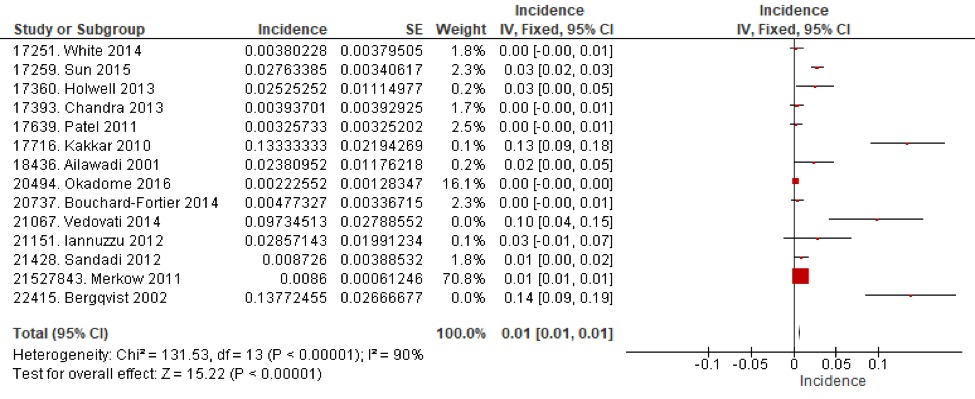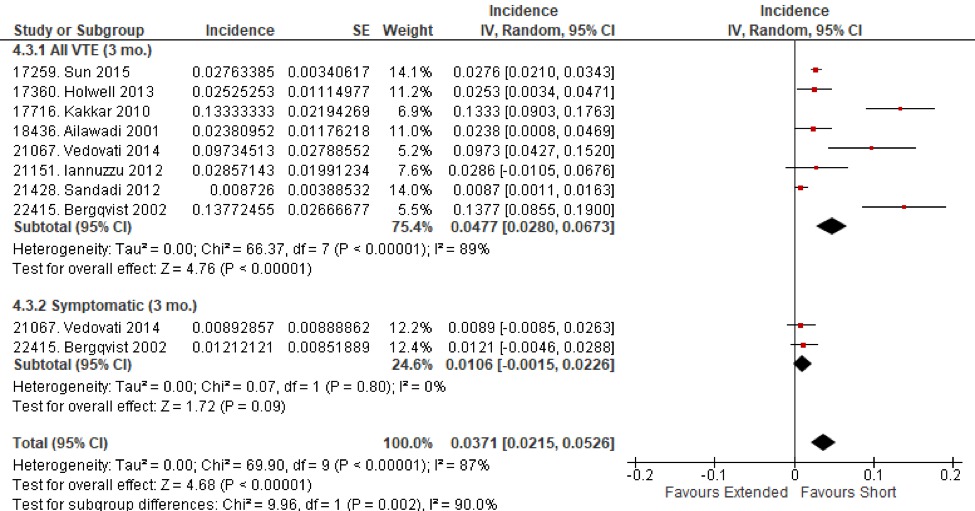|
Back to 2018 Posters
INCIDENCE OF DELAYED VENOUS THROMBOEMBOLIC EVENTS IN PATIENTS UNDERGOING ABDOMINAL AND PELVIC SURGERY FOR CANCER, A SYSTEMATIC REVIEW.
Pablo Serrano Aybar*1, Sameer Parpia2, Leyo Ruo1, Mohit Bhandari1
1Surgery, McMaster University, Hamilton, ON, Canada; 2Oncology, McMaster University, Hamilton, ON, Canada
Background: This is a systematic review and meta-analysis to determine the post-hospital discharge incidence of venous thromboembolic events (VTE) in patients undergoing abdominal and pelvic surgery for cancer and not receiving long-term prophylaxis.
Methods: We searched Medline, Embase, and Pubmed for studies evaluating VTE incidence following abdominal cancer surgery at 3 months. Study selection, data abstraction and risk of bias (Cochrane and MINORS tool) were performed in duplicate. Statistical heterogeneity was calculated and explored via subgroup analysis.
Results: Of 4214 abstracts retrieved, 94 studies were analyzed. There were 17 studies reporting either 1 month or 3 month data. Only 10 reported the primary outcome (65,828 patients),The proportion of VTE at 3 months following surgery was 3.46%, 95% confidence interval (CI) 2.35-4.58 (1911 events). VTE at 1 month was reported in 12 studies (28,484 patients) with a proportion of 0.81%, 95% CI 0.38-1.24 (283 events). Heterogeneity of the pooled 3-month incidence was high (I2= 89%). Subgroup analysis (symptomatic versus all VTE events) revealed a proportion of symptomatic VTE at 3 months of 1.06% 95% CI 0.15, 2.26(66 events, only reported by randomized trials), which explained heterogeneity (p < 0.001). The quality of the evidence was very low. Observational studies were at high risk of bias due to poorly defined methods of data collection, which may have resulted in biased outcome assessment. Sensitivity analysis showed that the proportion of symptomatic VTE in randomized studies was similar to that of retrospective studies, 2.12%, 95% CI 1.32-2.92.
Conclusions: Incidence of VTE following abdominal cancer surgery is low. Most studies focus on composite outcomes, including both asymptomatic and distal events, which are not patient-important outcomes. Publication bias is strongly suspected, with few studies identifying symptomatic events. Sensitivity analysis explained heterogeneity and validated our results.

Figure 1: Post-discharge VTE incidence

Figure 2. Subgroup analysis comparing all versus symptomatic VTE at 3 mo.
Back to 2018 Posters
|


